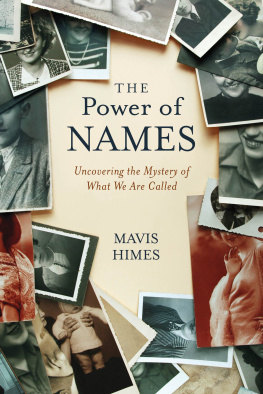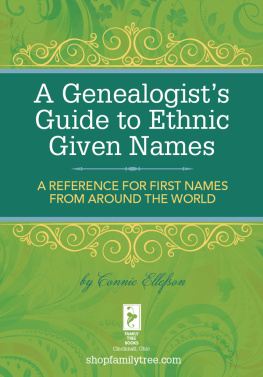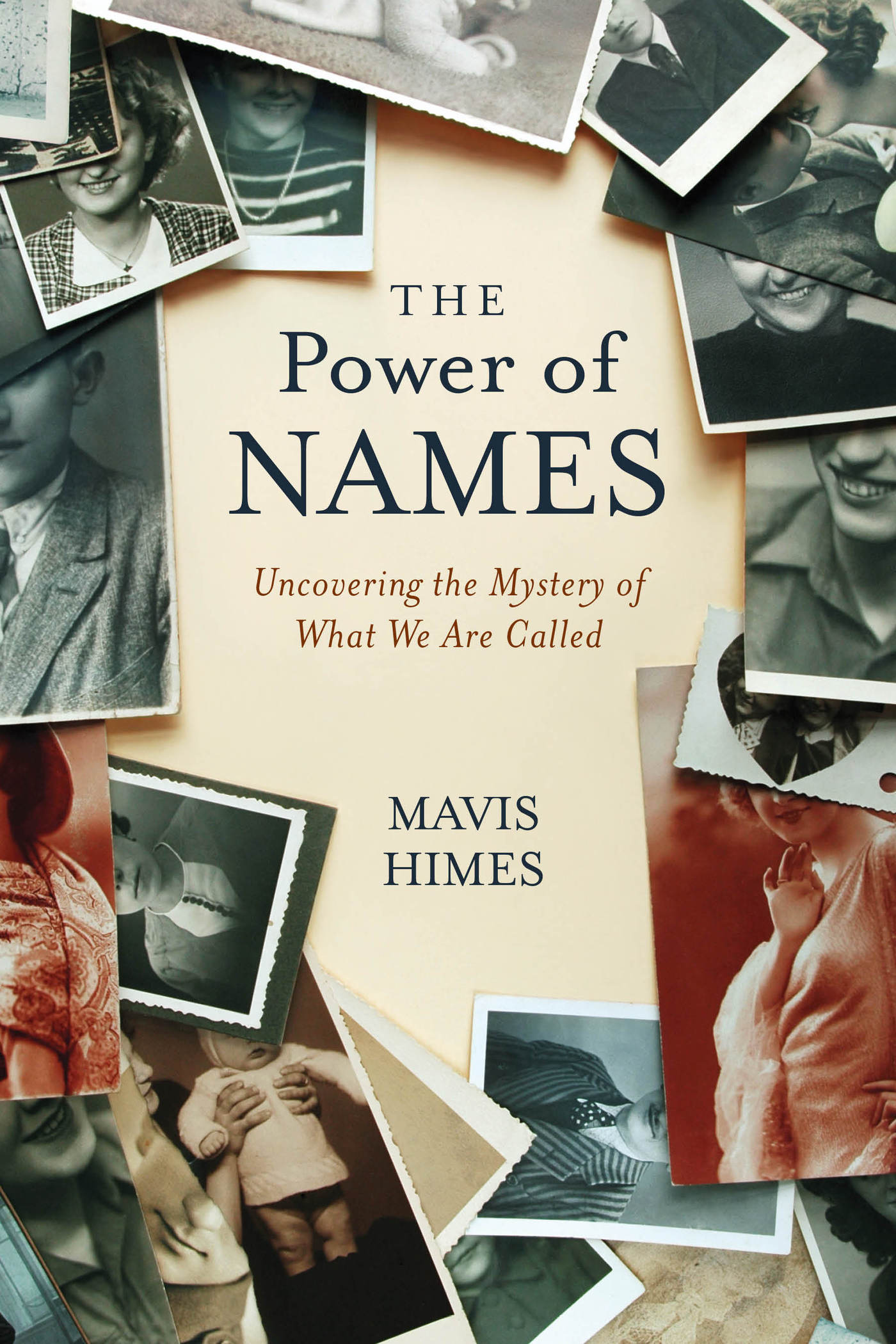The Power of Names
The Power of Names
Uncovering the Mystery of
What We Are Called
Mavis Himes
ROWMAN & LITTLEFIELD
Lanham Boulder New York London
Published by Rowman & Littlefield
A wholly owned subsidiary of The Rowman & Littlefield Publishing Group, Inc.
4501 Forbes Boulevard, Suite 200, Lanham, Maryland 20706
www.rowman.com
Unit A, Whitacre Mews, 26-34 Stannary Street, London SE11 4AB
Copyright 2016 by Rowman & Littlefield
All rights reserved. No part of this book may be reproduced in any form or by any electronic or mechanical means, including information storage and retrieval systems, without written permission from the publisher, except by a reviewer who may quote passages in a review.
British Library Cataloguing in Publication Information Available
Library of Congress Cataloging-in-Publication Data
Name: Himes, Mavis, author.
Title: The power of names : uncovering the mystery of what we are called / by Mavis Himes.
Description: Lanham : Rowman & Littlefield, 2016. | Includes bibliographical references and index.
Identifiers: LCCN 2015039185| ISBN 9781442259782 (cloth : alk. paper) | ISBN 9781442259799 (electronic)
Subjects: LCSH: Names, Personal--Psychological aspects. | Identity (Psychology)
Classification: LCC CS2309 .H56 2015 | DDC 929.4001/9--dc23 LC record available at http://lccn.loc.gov/2015039185
 TM The paper used in this publication meets the minimum requirements of American National Standard for Information Sciences Permanence of Paper for Printed Library Materials, ANSI/NISO Z39.48-1992.
TM The paper used in this publication meets the minimum requirements of American National Standard for Information Sciences Permanence of Paper for Printed Library Materials, ANSI/NISO Z39.48-1992.
Printed in the United States of America
To the memory of my parents
Louis ben Moishe v Chaya and
Miriam bat Hymie v Bertha
When, as a child, I wrote my name for the first time,
I knew I was beginning a book.
Edmond Jabs, The Book of Questions, vol. 1
NOM, name, should be read twice, from left to right
and from right to left.
Because two words compose it: NOM and MON, my name.
This name is mine. All names are personal.
Edmond Jabs, The Book of Resemblances, vol. 2
Preface
I wrote this book to interact with my own name through an exploration of names and naming more generally. Naturally, my thoughts and ideas about names and naming have been influenced by my work as a practicing psychoanalyst. Throughout my adult life and now in writing this book, my clinical practice and theoretical orientation have deepened my appreciation of the power of speech and language, in general, and of names, in particular. As a result, I have come to value the broad impact of proper names and the significant role they play in our lives.
Most of us do not stop to question our name; it is simply a given. Rarely do we stop and explore its meaning or significance, as if assuming a predetermined and fixed nature that requires little thought. In our current times, an explosion of genealogical research, courtesy of the Internet, may change this and bring names into a topic of interest. Moreover, a more recent trend of name-changing may also provoke some people to become more aware of the name they have been assigned.
In discovering the web of influence woven by my own name, I also realized the extent to which I have been formed by my own Jewish heritage. Consequently, detailed illustrations of my own ethnic roots have found their way into these pages. I hope my journey will inspire others to question and reflect on their own unique ancestral histories.
As I considered the forms and structures of names, I also became increasingly fascinated by the derivation of word meanings. To consider the lingering traces of word usage from their first appearance to the transformed yet subtle changes in meaning that occur over time intrigued and entertained me. Bastardizations and extensions of particular words and their reappropriated connotations added a further dimension of understanding. Also finding their way into this book are the narratives and vignettes of my patients and the friends and colleagues who sustained me during my research. It never ceased to amaze me how often those with whom I spoke on this subject had a story to share with me, if not about their own name then about the name of a friend, relative, or acquaintance. The spelling of names, the pronunciation of names, the meaning of names and name changesall made their way into a variety of conversations.
I discovered that people were comfortable sharing personal stories in social settings; talk of the proper name inevitably led to conversations about families and their origins. If I was at table with a group of ten friends, there would be ten stories; twelve people and there would be twelve stories. Some people claimed a deep attachment to their name, while others demonstrated disdain or indifference. Some said their name had a significant impact on their life, opening doors or creating a certain confidence, whereas others shied away from their name, disliking the sound or pronunciation, the associations or the history. I am indebted to all those people who, knowingly or unknowingly, contributed in some way to this work and helped me recognize the power of the proper name as a shorthand and metaphor for ones personal life.
This book is a journey into the power and significance of this proper name, a name proper to each unique individual. While I have included some mention of First Nations and African cultures, these are certainly outnumbered in these pages by names, naming rituals, and etymological citations related to Western culture. However, I hope readers imaginations will carry them to other associations and places with which they may be familiar.
Finally, due to the sensitive and personal nature of this material, I did not include personal stories without permission and, in many cases, without certain modifications. Any references to my patients and their names have also been modified and disguised to protect confidentiality. In certain cases, I have had full consent to use exact name spellings.
Mavis Himes
Toronto, September 2014
Prologue
In my dream, I am shaking hands with Jacques Lacan. I ask him his name and he replies, with a smile, Why, my name is Jacques Lacanovitch.
This may seem a strange person to appear in ones dreams, but for me it was not a surprise. At the time I was undergoing my analytic formation in Lacanian psychoanalysis, and Lacan was in the forefront of my thoughts. Jacques Lacan was an iconoclast, a rebel, a radical thinker and a brilliant psychoanalyst, a man whose name was synonymous with originality, creativity, and innovation in the field of Freudian psychoanalysis. Often referred to as the French Freud, he read and reread, worked and reworked, the texts of the venerable old man of psychoanalysis, creating a new way to talk about and practice psychoanalysis. Nor was it surprising that I would have dreamed of Lacan with those letters appended to his name. During that phase of my personal analysis, I had been speaking about my name, Mavis Himes, and had looked into the fact that my father and his siblings had legally changed their surname from Heimovitch to Himes. Wouldnt you know it but those missing letters had gone and attached themselves in my dream to this grand old master. The dream rekindled my interest in my name and its impact on my life, to research the question of the proper name: How does the proper name function? And how does a name change, either voluntary or by coercion, affect the bearer of the name?
Next page












 TM The paper used in this publication meets the minimum requirements of American National Standard for Information Sciences Permanence of Paper for Printed Library Materials, ANSI/NISO Z39.48-1992.
TM The paper used in this publication meets the minimum requirements of American National Standard for Information Sciences Permanence of Paper for Printed Library Materials, ANSI/NISO Z39.48-1992.